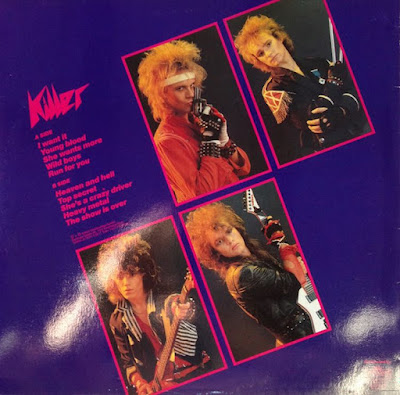KILLER
- Young Blood
Scratch Records
The 1986 album "Young Blood" by the Swiss
heavy metal band KILLER stands as a pivotal release in their discography,
marking a significant evolution in their sound. Often overshadowed by the more
widely known Belgian band of the same name, the Swiss KILLER forged their own
path, and "Young Blood" is a testament to their adaptability and
musicianship within the burgeoning 1980s metal scene.
Prior to "Young Blood," KILLER's sound, as
heard on albums like "Ladykiller" (1981) and "Thriller"
(1982), leaned heavily into a hard rock aesthetic, drawing frequent comparisons
to blues-infused acts like AC/DC and their Swiss compatriots KROKUS. These
earlier efforts were characterized by a more straightforward, groovier rock 'n'
roll approach with anthemic, singalong choruses.
However, "Young Blood" ushered in a distinct
shift towards a more polished and aggressive heavy metal sound. The album's
sonic landscape reveals clear influences from established titans of the genre
such as ACCEPT, SINNER and JUDAS PRIEST. This transformation is evident in
several key areas. The riffing on "Young Blood" became sharper, more
precise, and dynamically richer, often incorporating a driving, palm-muted
aggression reminiscent of Accept's Teutonic power. While maintaining a hard
edge, the band infused more intricate melodic lines, particularly in the vocals
and lead guitar work, echoing the approach of bands like Sinner. Furthermore,
the album strongly embraces the New Wave of British Heavy Metal (NWOBHM) ethos,
particularly the powerful twin-guitar attack and anthem-building prowess often
associated with Judas Priest; the overall "metal anthem" feel is far
more pronounced than in their earlier material.
A significant factor in this sonic evolution was the
album's lineup, featuring Mark B. Lay on vocals, Jan van Crow on guitars,
Martin Morelli on bass and Ronny Woolf on drums. Jan van Crow's guitar work, in
particular, is a standout feature. His solos aren't merely displays of speed
but are carefully constructed with a strong sense of melody and phrasing,
adding considerable depth and excitement to the tracks. His riff craftsmanship
provides a solid, powerful foundation throughout the album.
Key tracks that exemplify this refined heavy metal
sound include the title track "Young Blood", the driving "I Want
It" and the powerful "Heaven and Hell." Beyond these, "Wild
Boys" demonstrates the band's capability for energetic, pure heavy metal
anthems, completely distinct from the Duran Duran song of the same name
released around the same period. "She's a Crazy Driver" further
showcases KILLER's ability to combine relentless rhythms with compelling
melodic hooks.
Visually, "Young Blood" also makes a strong
statement. The album cover, featuring a flaming iron arrow piercing an exposed,
mechanical heart, immediately draws parallels to Accept's iconic "Metal
Heart" album cover released just a year prior. Both artworks share a
central "metal heart" motif, an industrial aesthetic, and themes of
power and resilience that were prevalent in 1980s heavy metal imagery. Whether
a direct influence or a reflection of the era's shared artistic sensibilities,
this visual connection effectively complements the album's powerful metallic
content.
In conclusion, "Young Blood" represents a
crucial turning point for the Swiss band KILLER, moving them firmly into the
realm of traditional heavy metal. Its strong songwriting, powerful
performances, and notable guitar work make it a compelling listen for fans of
80s European metal, solidifying its place as an important, albeit sometimes
overlooked, chapter in their legacy.
Nick Parastatidis



Δεν υπάρχουν σχόλια:
Δημοσίευση σχολίου